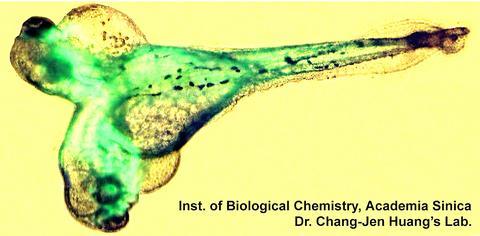In a world first, scientists at the Academia Sinica inadvertently developed a genetically engineered two-headed fluorescent zebrafish with two hearts.
Researchers conducting the research project said that the existence of such a creature had never been documented anywhere else on Earth.

PHOTO: DR. HUANG CHANG-JEN'S LAB
Huang Chang-jen (
As of yesterday, the weird, green fluorescent fish has been alive for eight days. Its has grown to 3mm from its original 2mm.
"You can say they are actually a big zebrafish and a small one sharing a body," Huang told the Taipei Times.
After checking related academic papers, Huang said that he found no documentation that such a creature had ever existed before.
Huang has used fluorescent zebrafish as a model organism for the study of functional genomics for years. To study the development of muscular dystrophy, Huang injected a gene causing the death of muscle cells into more than 200 zebrafish embryos. The research results would be used to develop drugs to cure the disease.
The rare two-headed fish inspired Huang to start studying the mechanisms causing conjoined creatures.
Again, the results of his research would be used to develop drugs to counter the development of conjoined babies. There are three to four conjoined births per 100,000 in Taiwan which, according to Huang, is a much higher rate than in most other countries. In some countries, Huang said, there is only one conjoined birth in more than 200,000.
Basically, the gene injected into the zebrafish causes the death of muscle cells and affects the early development of embryos. Huang declined to reveal details about the gene he used.
"Scientifically speaking, we still have a long way to go because we have not yet created a second two-headed conjoined zebrafish," Huang said.
Huang and his team repeated the experiment on Wednesday by injecting the same gene into more than 100 embryos, but only found a few abnormal creatures which were not conjoined.
According to Huang's pet-fish sources, a two-headed red dragon fish has been seen before but never a two-headed conjoined zebrafish.

‘DENIAL DEFENSE’: The US would increase its military presence with uncrewed ships, and submarines, while boosting defense in the Indo-Pacific, a Pete Hegseth memo said The US is reorienting its military strategy to focus primarily on deterring a potential Chinese invasion of Taiwan, a memo signed by US Secretary of Defense Pete Hegseth showed. The memo also called on Taiwan to increase its defense spending. The document, known as the “Interim National Defense Strategic Guidance,” was distributed this month and detailed the national defense plans of US President Donald Trump’s administration, an article in the Washington Post said on Saturday. It outlines how the US can prepare for a potential war with China and defend itself from threats in the “near abroad,” including Greenland and the Panama

A wild live dugong was found in Taiwan for the first time in 88 years, after it was accidentally caught by a fisher’s net on Tuesday in Yilan County’s Fenniaolin (粉鳥林). This is the first sighting of the species in Taiwan since 1937, having already been considered “extinct” in the country and considered as “vulnerable” by the International Union for Conservation of Nature. A fisher surnamed Chen (陳) went to Fenniaolin to collect the fish in his netting, but instead caught a 3m long, 500kg dugong. The fisher released the animal back into the wild, not realizing it was an endangered species at

The High Prosecutors’ Office yesterday withdrew an appeal against the acquittal of a former bank manager 22 years after his death, marking Taiwan’s first instance of prosecutors rendering posthumous justice to a wrongfully convicted defendant. Chu Ching-en (諸慶恩) — formerly a manager at the Taipei branch of BNP Paribas — was in 1999 accused by Weng Mao-chung (翁茂鍾), then-president of Chia Her Industrial Co, of forging a request for a fixed deposit of US$10 million by I-Hwa Industrial Co, a subsidiary of Chia Her, which was used as collateral. Chu was ruled not guilty in the first trial, but was found guilty

DEADLOCK: As the commission is unable to forum a quorum to review license renewal applications, the channel operators are not at fault and can air past their license date The National Communications Commission (NCC) yesterday said that the Public Television Service (PTS) and 36 other television and radio broadcasters could continue airing, despite the commission’s inability to meet a quorum to review their license renewal applications. The licenses of PTS and the other channels are set to expire between this month and June. The National Communications Commission Organization Act (國家通訊傳播委員會組織法) stipulates that the commission must meet the mandated quorum of four to hold a valid meeting. The seven-member commission currently has only three commissioners. “We have informed the channel operators of the progress we have made in reviewing their license renewal applications, and